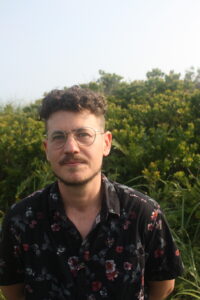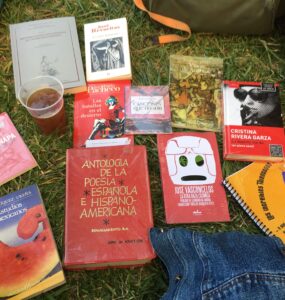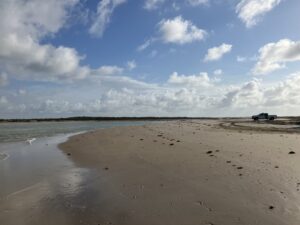Illuminating Humanities: AJ Baginski

Dr. AJ Baginski, 2022-2024 Glasscock Postdoctoral Research Associate, Humanities: Land, Sea, Space Initiative, Texas A&M
The Glasscock Center is excited to continue this series that highlights humanities research at Texas A&M, as well as the vital role played by the humanities beyond the academy.
The Glasscock Center is excited to continue its series, which highlights humanities research at Texas A&M and the vital role played by the humanities both at the university and in the world beyond the academy.
For this highlight, we invite Dr. AJ Baginski to tell us about his experience as a Postdoctoral Research Associate (2022–2024) for the Glasscock Center’s Humanities: Land, Sea, Space Initiative.
Dr. AJ Baginski joined the Glasscock Center in the summer of 2022 as a Postdoctoral Research Associate for the Humanities: Land, Sea, Space (HLSS) Initiative. His research draws on critical theory and philosophy from Latin America and the US to examine the contemporary literature and environment of the U.S.-Mexico border. Dr. Baginski is currently writing his single-author book manuscript, Fictions of Proximity: Environments of Fantasy Along the U.S.-Mexico Border, which investigates the meanings for different groups of people in the US and Mexico to be close to each other geographically, culturally, and economically. His most recent publication, “From Correlation to Corroboration: When the Weather Makes Sense of Death,” examines the limitations of the idea of the Anthropocene as a political and historical reality and argues for greater attention to the psychological challenges posed by environmental catastrophe through an analysis of Makoto Shinkai’s film Weathering With You (2019).
The HLSS Initiative is a transdisciplinary research Initiative that applies humanistic methods of scholarship to the exploration of a range of environmental issues and challenges. As the Postdoctoral Research Associate, Dr. Baginski directed the Initiative’s programming, including leading a reading group and organizing events, such as film screenings, symposiums, and workshops. During his time at Texas A&M, Dr. Baginski served as a Stand Up facilitator in the Step In, Stand Up program, as well as a Pride mentor (through a program offered by the former Pride Center).
Former Glasscock Center Director Dr. Emily Brady shares that “Dr. Baginksi brought HLSS to a new level by developing deep connections between the Initiative’s key themes and topics in Latinx/Latina/Latino literature, arts, critical theory, and history. These connections are especially significant considering Texas A&M’s recent designation as an HSI. I was also impressed by the novel ways in which Dr. Baginski brought together different disciplines to drive cutting-edge research, which was always a central aim of HLSS.”
From the beginning, Dr. Baginski not only embraced the Glasscock Center’s ethos of facilitating free and open to the public events, he also extended it to create interaction and dialogue between non-academics and academics. In his first HLSS event, Dr. Baginski organized the screening of the documentary film The Cordillera of Dreams (2019) by Patricio Guzmán at The Queen Theatre in downtown Bryan.

Books collected from the Feria del Libro in Tijuana in 2018.
“I think we can get stuck within our R1 or research university silo and not engage with people outside…and something I appreciate about all the Glasscock Center’s events is that they have to be open to the public,” he says.
“[At the film screening] there was the possibility of having a dialogue between folks who have lived experiences, familial relationships and history with Chile and the academics who are invested in their way of thinking about Chilean politics.”
In the last year, Dr. Baginski’s programming for the Initiative centered on creating space for poetry and creative writing; doing so was important to him because Texas A&M does not have a creative writing program. In three different events, Landscapes of Belonging: Poetry Workshops and Recital with Raina J. León and Janel Pineda, AfroLatinx Life & Writing Symposium, and Seminar-Workshop on Decolonial AfroLatinx Poetry, participants were invited to explore their emotions through a variety of poetry and creative expressions. With faculty and student guest editors from Texas A&M, the series culminated with a special issue publication of the journal Latin@ Literatures entitled “Landscapes of Belonging.”
“There are emotional things related to our research that don’t make it into our academic writing…poetry or creative expression of different kinds is one of the only ways to give space or time to the emotional stuff that inevitably comes up when you’re doing academia or any other kind of work,” he says. “I hope that folks will continue to make space available for exploring, creatively, the emotional impacts of their education on themselves, their relationships to their families, and their identity.”
The two-year postdoctoral position was also an opportunity to spend much needed time working on research; specifically writing and publishing. For Dr. Baginski, being at the Glasscock Center fostered key relationships with many scholars who were instrumental in sustaining his research’s development.
“The nice thing about being in this humanities center at a research institution is that I’ve had access to a bunch of different faculty and scholars, both visiting and located here, who work across all of these different fields that I position myself in,” Dr. Baginski says. “My interaction with folks who are running other Initiatives and faculty have really allowed me to keep my intellectual research project going and added new layers of theorization to that project while also starting to think about my second project.”
Dr. Baginski’s next project is influenced by his identity as a transmasculine person and his advocacy work for transgender asylum seekers from Central America. Tentatively titled Transition and Translation, he will investigate how transness has influenced developments in Queer Theory in Latin America over the last couple of decades. Even though the theoretical, intellectual, and historical project is still in its early stages, he anticipates comparing the transnational trajectory of concepts of transness and queerness against other politicized strands of critical theory, like Afro-pessimism, originating in the U.S.

Mexico as seen from Boca Chica beach with a Border Patrol truck (this is where the Rio Grande empties into the Gulf of Mexico)
“I’ve been increasingly building relationships with people who are thinking about queerness and how it does or doesn’t translate across linguistic, national, and colonial contexts,” he says. “That work which I’ve been engaged in, not only as an academic but as an activist, organizer and community member, is influencing the way that I’m thinking about my second project.”
In Fall 2024, Dr. Baginski joins the University of Texas, Rio Grande Valley as an Assistant Professor of Mexican American Studies and Environmental Studies in the School of Interdisciplinary Programs and Community Engagement. He is looking forward to being closer geographically to the U.S.-Mexico border as he continues to work on existing projects and developing future projects.
“Dr. Baginski has been a welcomed addition to our team,” Dr. Troy Bickham, current Glasscock Center Director, says. “[He] has successfully shepherded the HLSS initiative to its exciting conclusion—wrapping up the Initiative and intertwining it with the larger interests in environmental humanities across Texas A&M and through which its initial goals will live on.”
In closing, Dr. Baginski notes that “Scholarly research is done by people from all kinds of backgrounds, including members of the LGBTQ+ community. In order to stay on top of cutting edge research trends, I hope that the rest of Texas A&M can be as welcoming to scholars and students from minority backgrounds as the Glasscock Center was to me.”
